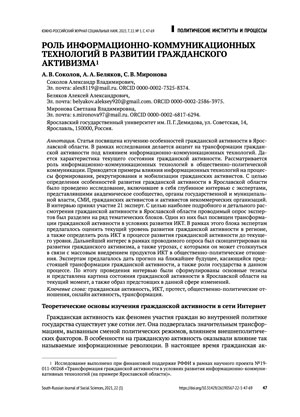Abstract
The article is devoted to the study of features of civil activity in Yaroslavl region. The study focuses on the transformation of civic activity under the influence of information and communications technologies. The current state of civil activism is described. The role of information and communications technologies in public and political communication is being considered. Examples are given of the impact of information technology on the formation, recruitment and mobilization of civic activists. In order to determine the characteristics of the development of civic activity in Yaroslavl oblast, a study was carried out which included in-depth interviews with experts representing the academic community, State and municipal authorities, Media, civic activists and non-profit activists. Twenty-one experts participated in the interview. In order to review civic activitsm in Yaroslavl region in the most detailed and in-depth manner, the expert survey was divided into a number of thematic clusters. One focused on the transformation of civic engagement in the context of ICT development. Under this cluster, experts were asked to assess the current level of civic activity in the region, as well as to determine the role of ICT in the development of civic activism to current levels. Further interest in the survey focused on the development of civic activism as well as the threats that it may face as a result of the massive introduction of ICT products into social and political relations. The experts were asked to give a forecast for the near future concerning the forthcoming transformation of civic activity as well as the role of the State in the process. On the basis of the results of the interview the main theses were formulated and a picture of the state of civic activity in Yaroslavl region to date was presented, as well as the image of forthcoming changes in this sphere.
Keywords
Funding information
The study was carried out with the financial support of RFBR within the framework of the research project № 19–011–00268 “Transformation of civil activity in conditions of the development of information and communications technologies (using Yaroslavl oblast as an example).”
References
Балчугов, А.В., Фоменков, А.А. (2019). Политизированный провластный блогинг в России: развитие политических идей и минимум безоговорочной поддержки. Огарев-online, 4, 1–7.
Бродовская, Е.В., Домбровская, А.Ю., Карзубов, Д.Н. (2017). Базовые онлайновые стратегии политического и гражданского участия российских пользователей. Социально-гуманитарные знания, 8, 28–41.
Бронников, И.А. (2019). Гражданский активизм как ресурс «мягкой силы» России. Вестник Московского государственного областного университета (электронный журнал), 1, 3–15.
Володенков, С.В. (2018). Digital-технологии в системе традиционных институтов власти: политический потенциал и современные вызовы. Вестник Московского государственного областного университета (электронный журнал), 2, 39–48.
Володенков, С.В. (2019). Влияние технологий интернет-коммуникаций на современные общественно-политические процессы: сценарии, вызовы и акторы. Мониторинг общественного мнения: Экономические и социальные перемены, 5, 341–364.
Зеленко, Б.И., Шиманская, Э.С. (2020). О специфике политического в российском цифросетевом пространстве. Власть, 3, 24–30.
Иванова, Л.В. (2020). К вопросу о кризисе критического мышления в дискурсе политической блогосферы. Знак: проблемное поле медиаобразования, 1(35), 102–111.
Мирошниченко, И.В. (2013). Сетевой подход в политических исследованиях: содержание и направления развития. Человек. Сообщество. Управление, 3, 68–86.
Мирошниченко, И.В., Рябченко, Н.А., Ячменник, К.В. (2017). «Новые» сетевые акторы развития локальной политики в условиях современной России». Вестник Пермского университета. Серия: Политология, 1, 150–163.
Нестеренок, Ю.И. (2013). Власть и политические блоги: проблемы взаимодействия. Государственное и муниципальное управление. Ученые записки, 3, 200–206.
Попов, К.Н. (2017) Интернет и формирование местных сообществ. Труды института системного анализа Российской академии наук, 2, 79–90.
Попова, О.В., Суслов, С.И. (2021). Сетевой анализ политических интернет-сообществ: от формализованных к «ненаблюдаемым» группам. Политическая наука, 1, 160–182. DOI: 10.31249/poln/2021.01.07
Родионов, М.А., Волкова, Т.А. (2019). Динамика коммуникационных процессов политических элит в условиях кризиса, связанного с пандемией COVID‑19. Коммуникология: электронный научный журнал, 4, 8–20.
Семилет, Т.А., Витвинчук, В.В., Фотиева, И.В., Лукашевич, Е.В. (2019). Социальные сети как культурные матрицы интернеткоммуникации. Культура и текст, 3(38), 226–242.
Сморгунов, Л.В. (2019). Институционализация управляемости и проблема контроля в пространстве цифровых коммуникаций. Южно-российский журнал социальных наук, 3, 62–75.
Соколов, А.В. Маклашин, И.С. (2013). Сетевая гражданская активность в современной России. Вестник КГУ, 6, 159–161.
Ушкин, С.Г. (2015). Теоретико-методологические подходы к изучению сетевой протестной активности: от «Умной толпы» к слактивизму. Мониторинг, 3, 3–12.
Фролов, А.А., Агурова, А.А. (2019). Индексный анализ гражданской активности в социальных сетях. Известия Иркутского государственного университета. Серия Политология. Религиоведение, 29, 28–43.
Химичук, Е.В. (2018). Блог: предпосылки и перспективы развития нового инструмента виртуальной демократии. Политика и общество, 2, 32–38.
Щербакова, В.А. (2018). Институциализация социальных сетей. Коммуникология: электронный научный журнал, 3, 93–99.
Volpi, F., Clark, J.A. (2019). Activism in the Middle East and North Africa in times of upheaval: social networks’ actions and interactions. Social Movement Studies, 18, 1–16, DOI: 10.1080/14742837.2018.1538876
McAdam, D., McCarthy, J.D., Zald, M.N. (1988). Social Movements. In N.J. Smelser (Ed.) Handbook of Sociology. Beverely Hills, CA: Sage Publications.
Nabatchi, T., Sancino, A., Sicilia, M. (2017). Varieties of Participation in Public Services: The Who, When, and What of Coproduction. Public Administration Review, 77(5), 766–776.
Rheingold, H. (2003). Smart Mobs. Cambridge: Perseus Publishing.
Tilly, C. (1978). From Mobilization to Revolution. Reading MA: Addison-Wesley.


